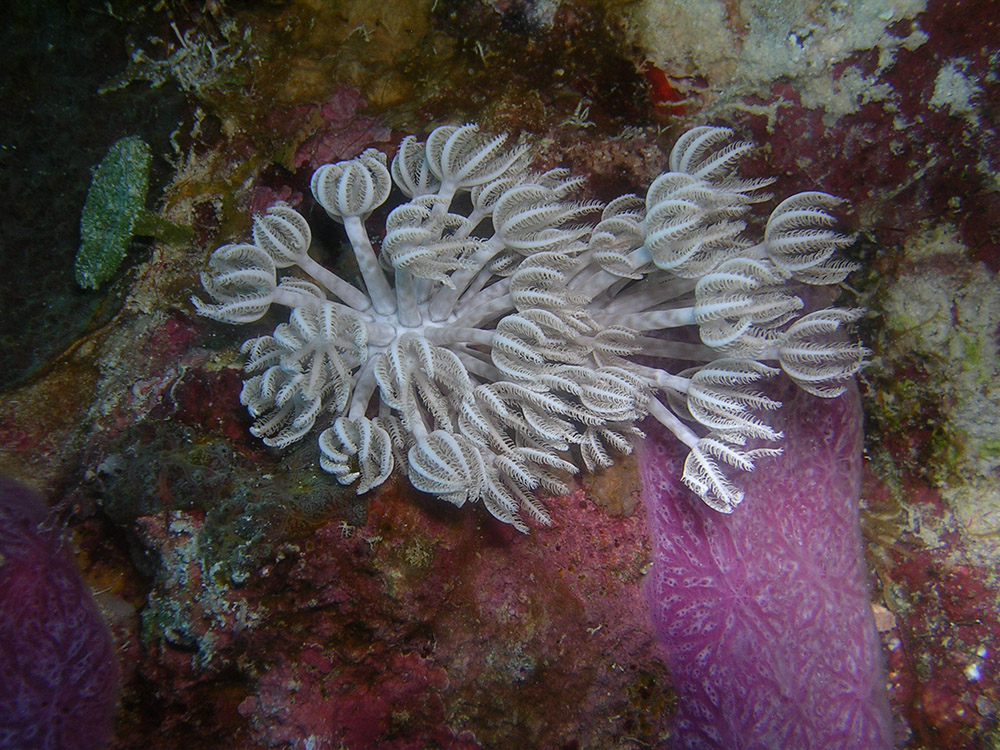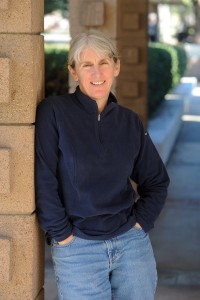Collaborative Coral Research Funded by NSF
April 22, 2015
The National Science Foundation has awarded Harvey Mudd College Department of Biology Chair Cathy McFadden a $494,481 collaborative grant with the American Museum of Natural History (AMNH) to study how environmental conditions in the distant past may have affected the evolutionary development of corals and sea anemones—research that will help shed light on how current climate change endangers coral reefs and the rich sea life they support.
“One of the big worries about corals right now is ocean acidification,” McFadden explained. “Increasing amounts of CO2 in the atmosphere dissolve into sea water, creating carbonic acid. Under acidic conditions, it’s more difficult for corals to produce their skeletons.”
Corals build skeletons in many different ways, McFadden explained. Some corals don’t have any skeleton; others have crystals of calcium carbonate in the tissue that make them stiff, and still others have massive calcium carbonate structures that form beautiful, colorful reefs both in shallow water and the deep sea.
“One of our main goals is to figure out how these groups with very different types of skeletons are related to one another,” McFadden said. “Which groups evolved from others and in what order, and at what point in the past. In particular, we want to know whether the evolution of a particular type of skeleton, or the loss of a skeleton, correlated with past environmental conditions.”
Understanding these evolutionary relationships has proven difficult for scientists so far, because corals and sea anemones belong to one of the oldest groups of multicellular animals, believed to have evolved over 600 million years ago.
McFadden and her collaborator at the AMNH, Estefania Rodríguez, hope that by using a new technology—whole genome sequencing—they can construct a time-calibrated evolutionary tree for corals and sea anemones and map gains and losses of skeletal traits to corresponding environmental conditions. The information gained could help inform predictions about the effects of current and future environmental changes on coral reefs.
The grant will also support valuable educational opportunities for students at Harvey Mudd and the City University of New York’s College of Technology (City Tech).
“We will be involving Harvey Mudd and City Tech students in research that uses really cutting-edge, next-generation genome sequencing,” McFadden said. “It’s a great opportunity for students to pursue and experience research projects that are at the forefront of scientific discovery.”
Harvey Mudd students will also participate in summer research exchanges at the American Museum of Natural History.
“Being able to send students to the AMNH for the summer will put them in a totally different research environment than we have here,” said McFadden. “Museums are amazing places for doing biodiversity research. Students will see a really different side of research science.”
City Tech, a predominantly minority-serving technical institution, will send students to Harvey Mudd to do summer research in McFadden’s lab. They will be paired with Harvey Mudd students on projects.
“This may be the first and only research experience that students from City Tech will get, as the institution does not have a research focus,” said McFadden. “We think partnering students with different educational and probably cultural backgrounds will be an advantage to students coming from both institutions.”
The grant will also support a new postdoctoral fellow at Harvey Mudd—a marine biologist who will teach, supervise student researchers and conduct research in McFadden’s lab over the next three years.
McFadden and collaborator Rodríguez will also use the grant to support public outreach efforts. The team will use information gained in the study to develop educational materials in both English and Spanish for elementary school children and preschoolers for the AMNH’s active outreach programs. The materials will be geared toward educating children about environmental concerns and diversity in the oceans.

